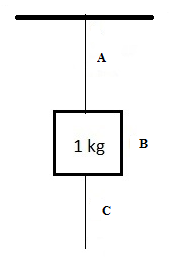NEET Physics is the scoring paper in the medical entrance examination. Here, you will discover the NEET Physics MCQ Questions for all Concepts as per the latest syllabus. Practice more on a regular basis with these NEET Physics objective questions on air pollution and improve your subject knowledge & problem-solving skills along with time management. NEET Physics First Law of Motion Multiple Choice Questions make you feel confident in answering the question in the exam & increases your scores to high.
MCQ on First Law of Motion
1. Why does a rider on horseback fall when the horse starts running all of a sudden?
(a) The rider is suddenly afraid of falling
(b) The lower body of the rider moves forward with the horse but the inertia of rest keep the upper body at rest
(c) The rider is pushed backwards
(d) None of the above options
Answer
Answer: (b) The lower body of the rider moves forward with the horse but the inertia of rest keep the upper body at rest
2. Why do passengers in a moving train suddenly feel a jerk in the forward direction when the train stops abruptly?
(a) The upper body of passengers continues to be in the state of motion while the lower part of the body which in contact with the seat remains at rest
(b) The back of the seat pushes passengers forward
(c) The inertia of rest stops the train and takes the passengers forward
(d) Nothing can be said due to insufficient data
Answer
Answer: (a) The upper body of passengers continues to be in the state of motion while the lower part of the body which in contact with the seat remains at rest
3. Which of the following statements is true about inertia?
(a) Inertia is the property of a body by virtue of which the body is unable to change by itself the state of rest.
(b) Inertia is the property of a body by virtue of which the body is able to change by itself the state of rest
(c) Inertia is the property of a body by virtue of which the body is unable to change by itself the direction of motion
(d) Inertia is the property of a body by virtue of which the body is unable to change by itself the state of rest and uniform linear motion
Answer
Answer: (d) Inertia is the property of a body by virtue of which the body is unable to change by itself the state of rest and uniform linear motion
4. Why does a man getting off a moving bus fall down?
(a) He falls because of his habit of leaning forward
(b) Due to inertia of motion, the upper body continues to be in motion in the forward direction but the feet comes to rest as soon as they touch the ground
(c) Due to inertia of rest, the road is left behind and the man reaches forward
(d) Due to all of the reasons stated above
Answer
Answer: (b) Due to inertia of motion, the upper body continues to be in motion in the forward direction but the feet comes to rest as soon as they touch the ground
5. A boy in the topmost birth in a compartment of a train drops an apple aiming at the open hands of his birth while the train is just going to stop at the railway station. Where will the apple fall if the brother is sitting vertically below his hands at a distance of 2 meters?
(a) The apple falls precisely on the hands of his brother
(b) Slightly away from the hands of his brother in the direction opposite to the direction of the motion of the train
(c) Slightly away from the hands of his brother in the direction of the motion of the train
(d) None of the above
Answer:
Answer
Answer: (c) Slightly away from the hands of his brother in the direction of the motion of the train
6. Which of the following does Newton’s first law of motion describe?
(a) Inertia
(b) Work
(c) Energy
(d) Moment of Inertia
Answer
Answer: (a) Inertia
7. A bird weighing 2 kg is locked inside a cage of mass 1 kg. If the bird starts flying what will be the weight of the bird and cage assembly?
(a) 4 kg
(b) 3 kg
(c) 2.5 kg
(d) 1.5 kg
Answer
Answer: (b) 3 kg
8. A mass of 1 kg is suspended by a string A and another string C is connected to its lower end as shown in the figure. What will happen if a sudden jerk is given to C?

(a) The mass starts to rotate
(b) The portion AB of the string will break
(c) The portion BC of the string will break
(d) The string remains intact
Answer
Answer: (c) The portion BC of the string will break
9. In the above question what will happen if the string C is stretched slowly?
(a) The portion BC of the string breaks
(b) The portion AB of the string breaks
(c) None of the strings breaks
(d) None of the above options
Answer
Answer: (b) The portion AB of the string breaks
10. What will happen if a force is applied to a body moving with a constant speed along a straight line?
(a) The speed increases
(b) The direction changes
(c) The momentum decreases
(d) Continues to move with uniform velocity
Answer
Answer: (d) Continues to move with uniform velocity
